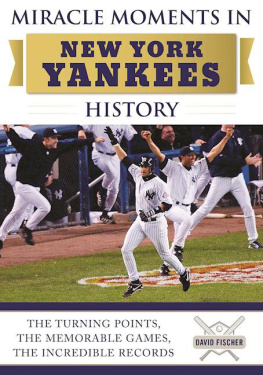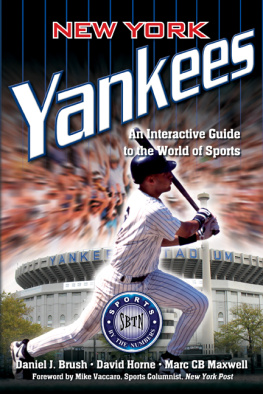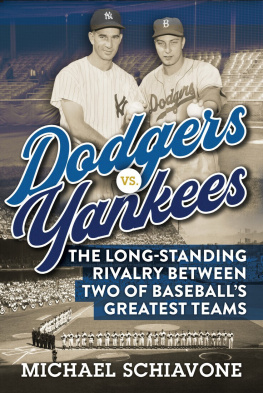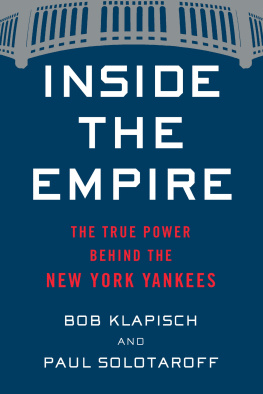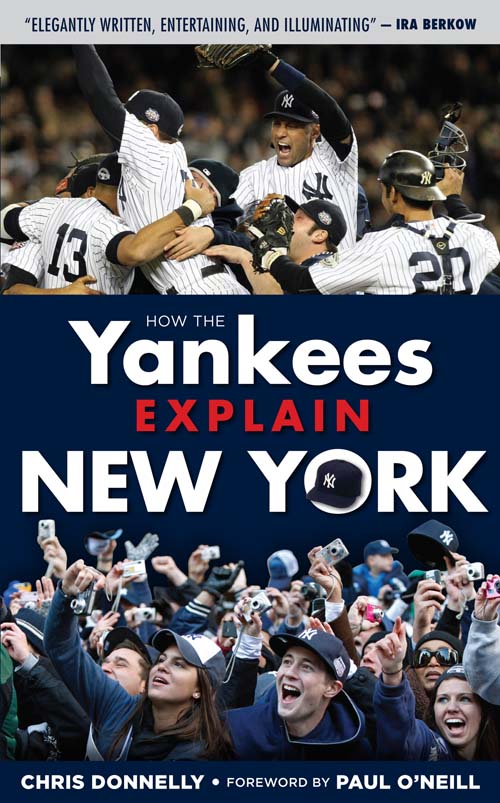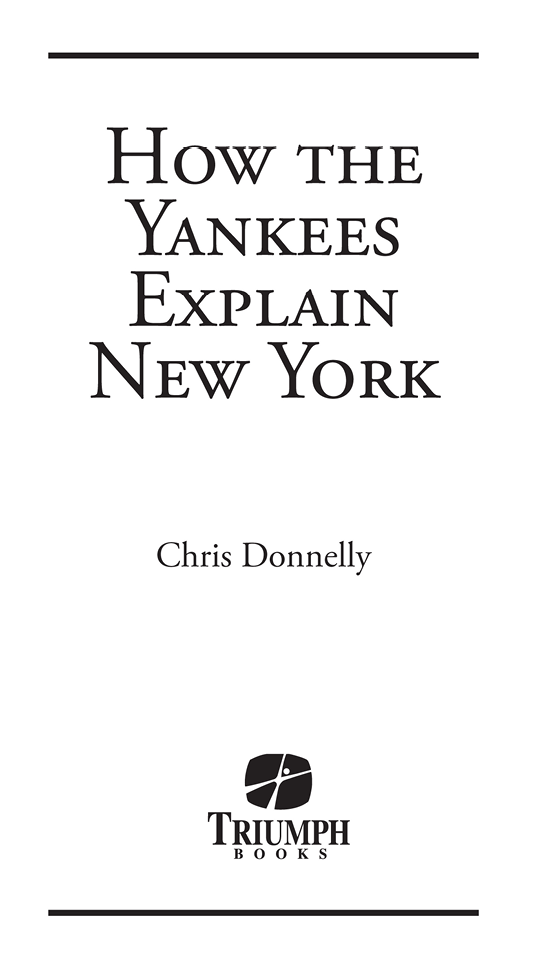
To Jamie Leigh, whose brains and beauty are all the inspiration I need to keep writing books.
To Erin Elisabeth, you make Daddy prouder and happier with each passing minute.
Another book that Christopher Martin Singer would have loved. Still missing you buddy.
Contents
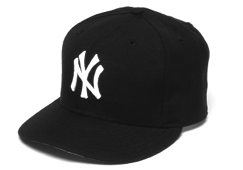
Foreword by Paul ONeill
It was early November 1992, and I was out mowing the lawn of my southern Ohio home. Just shy of my 30 th birthday, Id spent most of those 30 years in Ohio to that point. I was born and raised there, spending my youth rooting for the Big Red Machine. Eventually, I was fortunate enough to play for my hometown Reds for parts of eight seasons. When I got in from finishing my yard duties, there was a message on my machine informing me that Id been traded to the New York Yankees.
My wife and I were devastated. New York seemed like it was another world away. Outside of games at Shea Stadium, I hadnt spent any time in the city and didnt know much about it. I just knew that it was a huge place with millions of people who were rabid about their sports. I also knew I was going to a team that, even with all its tradition and history, had not been to the postseason in a long time. This is not going to be an easy transition , I thought to myself.
Instead the nine seasons I spent playing right field for the Yankees were the best and most magical experience in my life. It taught me the meaning of being a Yankee and appreciating the honor and tradition that goes with it. The idea of playing in New York could have overwhelmed me and my family, but instead I was fortunate to be part of creating a winning atmosphere that would rival the Yankees dynasties of old. It is the same can-do spirit we see from New York City time and again.
That spirit was, of course, best exemplified in the aftermath of the September 11 th attacks. The city very easily could have given in to fear. New Yorkers, however, rose up as one community. They supported one another. They persevered. During that same period, I got to see just how much the Yankees mean to the city. While we werent able to win the championship that year, I could never possibly forget the emotion, the passion, and the energy of the fans during that playoff run. In times of great tragedy, baseball can seem so trivial. But for the entirety of that postseason, we really felt like we were playing for the hope and pride of New York.
I was also fortunate to be a part of the team during a period of resurgence both with the organization and with New York City. I was thrown in with an amazing group of talented individuals to both play and work with from the front office folks to my managers, the coaching staffs, and, of course, the guys I took the field with. You dont see guys like Derek Jeter, Andy Pettitte , Jorge Posada, and Mariano Rivera pop up just everyday. And to be able to have them on the same team, surrounded by a Bernie Williams or a Tino Martinez, was more then anyone could ask for. And, of course, it was an honor to play alongside Don Mattingly, who became my first good friend on the Yankees.
Throughout the years, there were countless examples of how the Yankees and everything surrounding the team represented all aspects of the city. Chris Donnelly does a great job of illustrating that by pointing to the creativity and vibrant energy of New York and how it can be seen in the Bleacher Creatures, or how the architecture and makeup of the city is reflected in both the old and the new Yankee Stadium. He deftly examines how no team draws more media attention than the Yankees, a reflection of the media presence and constant pressure and attention that is New York City. Donnelly nails that feeling of hearing Bob Sheppard and seeing Yankee Stadium for the first time while also talking about the excitement and hope generated each New Years in Times Square. And, as he notes, perhaps the most beautiful aspect of New York City is the idea that if you can make it there, you can make it anywhere. I was fortunate enough to have that happen and to get to witness it with players like Shane Spencer and Luis Sojo.
New Yorkers are a tough, gritty bunch, but they are also kind, caring, and compassionate. I experienced that tenderness firsthand during Game 5 of the 2001 World Series. Standing in right field at the top of the ninth inning, I began to hear the crowd chanting my name from all pockets of the stadium. It was an overwhelming, extremely emotional moment. Who would have thought that the message on my answering machine nine years earlier, which I thought was such bad news, would have turned into this wonderful moment? I also experienced that tenderness two years earlier when, in the middle of the 1999 World Series, my father passed away. People, many of whom I had never met, were so unbelievably kind and supportive of me. Words cannot accurately describe how that support helped get me through such a difficult time.
It all adds up to New York being a special place and the Yankees being a unique, unprecedented organization. Despite spending nearly all of my life in Ohio, most people, especially New Yorkers, associate me with the Yankees. And as I have come to learn and as Donnelly makes clear in the following pages, it is true: the Yankees really do explain New York.
Paul ONeill
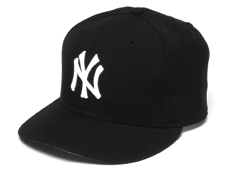
1. The Boss Steinbrenner and Boss Tweed
Outside of its literal meaning, the term boss has several connotations. Generally, none of them are positive. Nobody likes the person in charge, and even if they do, they always think they can do a better job. In politics boss has become a derogatory term slapped onto those who use money and power to influence their political party and the functions of government. In business the boss is the person who keeps you late, who doesnt pay you enough, who never thanks you, always steals credit for your ideas, and always blames you when their ideas dont work out.
New Yorkers have bestowed the title of boss on three prominent individuals. One is Bruce Springsteen. (To avoid getting heckled in my Garden State home, I must point out that New Jerseyans played a pretty significant role here.) But Springsteens nickname is given out of love and admiration for a rock starnot out of anger or spite. The other two men, however, were not given their titles out of respect, admiration, or love. They fit into the two derogatory terms outlined above. One was a politician; the other was a businessman. They were William Boss Tweed and George The Boss Steinbrenner.
Tweed ruled over the citys famous Tammany Hall faction, stealing millions from the city treasurer and becoming the symbol for political corruption. But he also pushed for the creation of hospitals, bridges, and museums and donated enormous sums of money to charity. Steinbrenner owned the Yankees for 37 years. He was suspended once and even banned from baseball in 1990 (before getting reinstated prior to the 1993 season) because of illegal or downright bizarre behavior. He could be extremely cruel to those who worked for him, particularly general managers, managers, and coaches. He recklessly attacked those who dared utter an unkind word about the Yankees, even implying that an umpire was purposely helping the Seattle Mariners during the 1995 postseason because he grew up in Oregon. [An] egomaniac wrapped in a bully inside an asshole, as author and illustrator Bruce McCall described him. And ultimate confirmation that villainy and the New York Yankees would be synonymous for all time.


